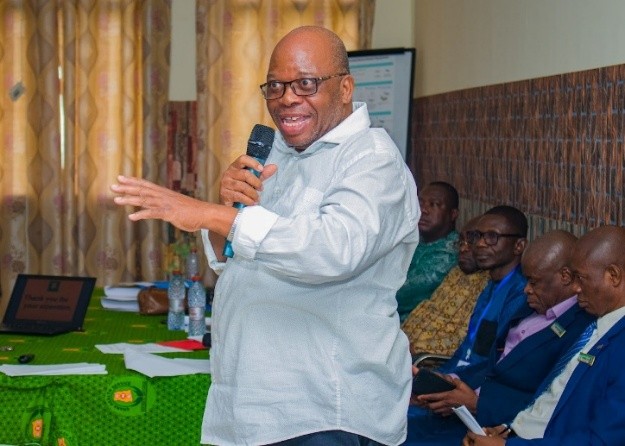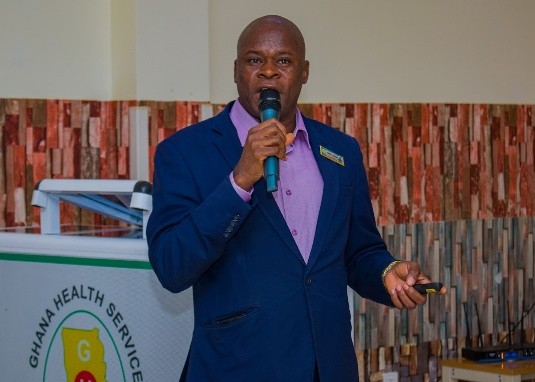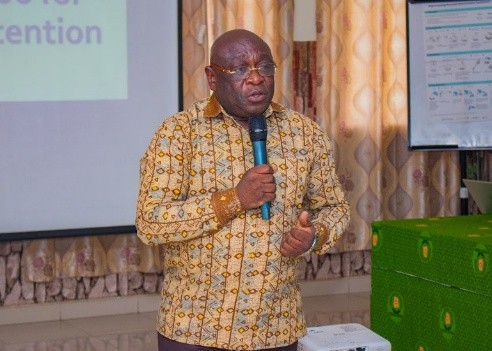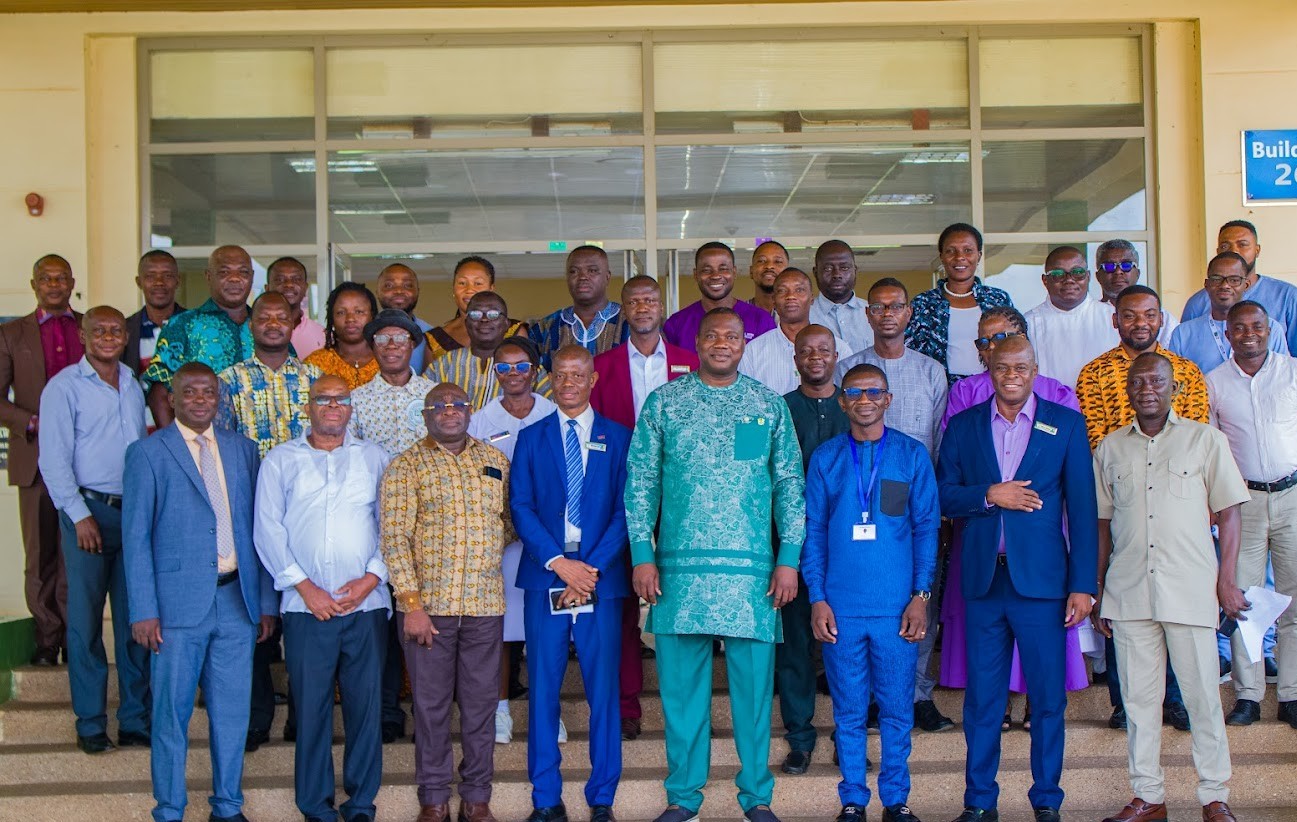A historic Joint Consultative Workshop was held on June 16, 2025, between the management of Simon Diedong Dombo University of Business and Integrated Development Studies (SDD-UBIDS), led by Vice-Chancellor, Professor Emmanuel Kanchebe Derbile, the Ag. Medical Director Dr. Philip K.K. Baabiineh, Upper West Regional Hospital (UWRH) and Dr. John B. K. Tampuori, the Expert and CEO of Ho Teaching Hospital.
The Workshop aimed at exploring collaborative strategies for establishing a School of Medical Sciences, Faculty of Health Sciences and Teaching Hospital for training various Health Professionals for Regional and National Development. In his welcome address, Dr. Baabiineh described the meeting as transformational and called on participants to plan and work together toward the shared vision. Professor Derbile, who chaired the session, emphasised the historic nature of the collaboration and called on all stakeholders to commit their expertise to the initiative. He commended the Consultant, Dr. John B. K Tampuori, CEO of Ho Teaching Hospital, Volta Region, members of the UWRH, the Technical Committee of Health Sciences Programme, at the University, and other partners for their dedication, stating that their joint effort would one day be remembered as a service to humanity. He remarked, “Let us work together and one day, we shall say we did it together for humanity and country.”
 Professor Sylvester Galaa, Chairman of the Technical Committee of the Health Sciences Programme at the Simon Diedong Dombo University of Business and Integrated Development Studies, presented the concept paper on behalf of the Technical Committee, citing that the establishment of a medical school has been a long-standing demand by key stakeholders in the Upper West Region. He outlined that Act 1001 of 2019, which established the University, supports such initiatives. The rationale for the Health Sciences Programme, he indicated included addressing regional health manpower shortages, ensuring equity in healthcare delivery and education, and aligning with the University’s Act, Act 1001 of 2019. Professor Galaa further stated that there was also, substantial community and professional support for the initiative as justified by Empirical and anecdotal evidence, such as engagements with the Ministry of Health and the Ghana Health Service, and the availability of regional infrastructure, which further provided opportunities for both short-term programmes rollout and long-term institutional development.
Professor Sylvester Galaa, Chairman of the Technical Committee of the Health Sciences Programme at the Simon Diedong Dombo University of Business and Integrated Development Studies, presented the concept paper on behalf of the Technical Committee, citing that the establishment of a medical school has been a long-standing demand by key stakeholders in the Upper West Region. He outlined that Act 1001 of 2019, which established the University, supports such initiatives. The rationale for the Health Sciences Programme, he indicated included addressing regional health manpower shortages, ensuring equity in healthcare delivery and education, and aligning with the University’s Act, Act 1001 of 2019. Professor Galaa further stated that there was also, substantial community and professional support for the initiative as justified by Empirical and anecdotal evidence, such as engagements with the Ministry of Health and the Ghana Health Service, and the availability of regional infrastructure, which further provided opportunities for both short-term programmes rollout and long-term institutional development.
The Committee proposed the establishment of a Faculty of Health Sciences with departments such as Public Health, Nursing and Midwifery, Allied Health, Medical Sciences, and Pharmacy and Pharmaceutical Sciences. Additionally, a Centre for Disease Surveillance and Control was recommended. The teaching approach would be learner-centred, involving Problem-Based Learning Techniques, traditional lectures, tutorials, community outreach which is already being practiced at the University, and ICT integration. Academic offerings would include undergraduate and postgraduate programmes across various disciplines such as public health, nursing, midwifery, allied health, biomedical sciences, physician assistantship, and pharmacy. The Centre for Disease Surveillance which should serve as a specialised research and support unit and was recommended for immediate implementation.
The proposed rollout strategy prioritises public health, followed by nursing and midwifery, allied health, medical sciences, pharmaceutical sciences, and the Centre for Disease Surveillance. A simultaneous establishment of the Faculty of Health Sciences and a School of Medical Sciences was proposed to respond to increasing interest in human biology and regional health professional shortages. Targeted audiences include nursing schools and professionals, with flexible delivery models such as sandwich, distance, and online programmes, in line with GTEC guidelines. Staffing would draw from the existing SDD-UBIDS faculty and health professionals in the Region, since the initial capacity for launching public Health Sciences Programmes is sufficient.
 In a presentation by Mr. Francis Luguniah, the Hospital Administrator, on behalf of the Ag. Medical Director, he indicated the Upper West Regional Hospital’s readiness to support the initiative, boasting a 290-bed capacity and a wide range of services, including general and specialist care such as ENT, maxillofacial and dental services, maternal and child health, surgery, mental health, pharmaceutical services, physiotherapy, intensive care, and COVID-19 management. Additional services introduced in recent years included dialysis, oncology, audiology, endoscopy, radiology, and several specialist clinics. Referral data from 2022 to 2024 indicates a steady increase in patient inflows from various health facilities in the Region.
In a presentation by Mr. Francis Luguniah, the Hospital Administrator, on behalf of the Ag. Medical Director, he indicated the Upper West Regional Hospital’s readiness to support the initiative, boasting a 290-bed capacity and a wide range of services, including general and specialist care such as ENT, maxillofacial and dental services, maternal and child health, surgery, mental health, pharmaceutical services, physiotherapy, intensive care, and COVID-19 management. Additional services introduced in recent years included dialysis, oncology, audiology, endoscopy, radiology, and several specialist clinics. Referral data from 2022 to 2024 indicates a steady increase in patient inflows from various health facilities in the Region.
The Hospital’s strategic objectives as indicated, included improving clinical and public health services, enhancing governance, strengthening health financing, developing human resource capacity through training and research, optimising ICT systems, and of course becoming a teaching hospital. The staff profile reveals strengths in general medical officers and professional nurses but also highlights shortages in specialists such as radiographers, pharmacists, and psychiatrists which can be handled as some staff would soon return from various study programmes, he added. The facility has robust infrastructure, including specialised units like an ICU, burns unit, radiology block, dialysis unit, and a wide range of equipment and systems to support advanced medical training and research.
 Based on the two presentations, Dr. Tampuori, the Expert, noted that for the Upper West Regional Hospital to qualify as a Teaching Hospital, it must have at least 300 beds, 30 more than its current capacity. He emphasised that this upgrade is feasible and urged SDD-UBIDS to engage key stakeholders such as the Regional House of Chiefs, the Parliamentary caucus, hospital staff, and political actors to garner support. He highlighted the importance of good branding and the benefits a medical school would bring to the Region. He also stressed the need for formal partnerships through Memoranda of Understanding between the University, The Hospital, doctors, and other tertiary institutions.
Based on the two presentations, Dr. Tampuori, the Expert, noted that for the Upper West Regional Hospital to qualify as a Teaching Hospital, it must have at least 300 beds, 30 more than its current capacity. He emphasised that this upgrade is feasible and urged SDD-UBIDS to engage key stakeholders such as the Regional House of Chiefs, the Parliamentary caucus, hospital staff, and political actors to garner support. He highlighted the importance of good branding and the benefits a medical school would bring to the Region. He also stressed the need for formal partnerships through Memoranda of Understanding between the University, The Hospital, doctors, and other tertiary institutions.
During the open forum, participants suggested involving principals of nursing training colleges, developing an implementation plan, and drafting a budget. The Pro Vice-Chancellor, Professor Issaka Kanton Osumana, affirmed the University’s readiness to learn from best practices and start with achievable steps.
In his closing remarks, the Vice-Chancellor, Professor Emmanuel Kanchebe Derbile, envisioned a promising future for the School of Medical Sciences. He reiterated the need for stakeholder engagement, valuable partnerships, support for professionals, and lessons from successful models elsewhere.
The second part of the Workshop discussed reviewing the Technical Committee’s detailed concept paper on the Health Sciences Programme, led by Professors Joseph Wulifan and Sylvester Galaa. Participants provided feedback on course structure, partnerships, programme naming, and duration. A soft copy of the report was to be shared for further review.
The workshop concluded with a renewed commitment to finalise proposals, mobilise support, develop curricula, and initiate the accreditation process with GTEC. This joint initiative is seen as a strategic step towards addressing critical regional health challenges while enhancing the academic and professional impact of the University, Regional and National.


